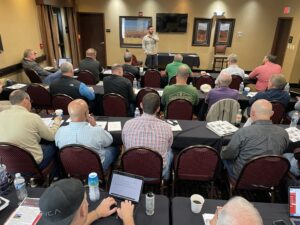
WASHINGTON (BP)–Voicing objections to the video game industry’s carte-blanche tactics to “confuse and corrupt” the country’s children, the chairman of the U.S. Senate Commerce Committee convened a March 21 hearing on video game violence.
“We are here to discuss the potential impact of an increasingly powerful medium,” said Sen. Sam Brownback, R.-Kan. “When it comes to violent television and movies, literally thousands of studies have pointed to a negative link between watching violence and anti-social behavior, responses and attitudes. But despite the skyrocketing popularity and profitability of violent video games, the impact and influence of these games has largely escaped public and parental attention,” Brownback said.
“We all have a role to play in protecting and caring for children,” he said, “and in doing what we can to make our country safer and our society more civil.”
The March 21 hearing featured a parade of experts and activists who testified about the impact of violent video games on children, with the consensus being that games such as “Duke Nukem,” “Doom” and “Carmeggedon” may have a profound impact on young Americans.
Notably absent from the hearings were members of the video and arcade industry. Executives from Sega, Hasbro, Hasbro Interactive, Nintendo, ID Software, Midway Games and the Video Software Dealers Association turned down invitations to the hearing.
“The highly popular game Duke Nukem combines the graphic killing of aliens with images of scantily clad women,” Brownback said. “Advanced players get to murder naked female prostitutes, some of whom are tied to posts and beg the player to kill them.”
One survey of students in grades four through eight found that almost half the students said their favorite electronic games involved violence, Brownback said.
“Defenders of these games say that they are mere fantasy and harmless role-playing,” the senator said, asking, “But is it really the best thing for our children to play the role of murderous psychopath? Is it all just good fun to positively reinforce virtual slaughter? Is it truly harmless to simulate mass murder?”
Most video and PC games produced are nonviolent, Brownback said. “But there are many games, sold in toy stores across the country, advertised in venues accessible to children and demonstrably popular among young people, which celebrate killing, carnage and cruelty,” Brownback said.
“Parents, of course, have the primary responsibility to protect, raise and care for their children,” he said. “But that doesn’t mean that companies have carte blanche to confuse and corrupt them.”
One segment of society that is apparently aware of interactive video games is the U.S. military, according to a report in CNSNews.com on the Internet. Eugene Provenzo, an education professor at the University of Miami, testified that the U.S. Marine Corps uses the video game Doom for combat training. Unfortunately, Provenzo testified, children much younger than the average military recruit also play Doom, which simulates a gunfight using the latest in digital technology.
“This is the cultural equivalent of genetic engineering,” Provenzo to the committee.
One member of the panel who testified said she believes violent interactive video games contributed to the tragic death of her teenage daughter at the hands of a teenage gunman in Paducah, Ky., in 1997.
Sabrina Steger said she is suing several manufacturers of the video games because of what she claims is the harmful influence on the teenager who massacred her 15-year-old daughter and several other children in a school shooting, according to CNSNews.com.
Danielle Shimotakahara, a seventh grade student from North Bend, Ore., said she has started a petition drive to put age restrictions on the games, but not many people have participated.
“I don’t think anybody cares,” she said. “I think every parent should go in the game room and check out what their kids are playing.”















